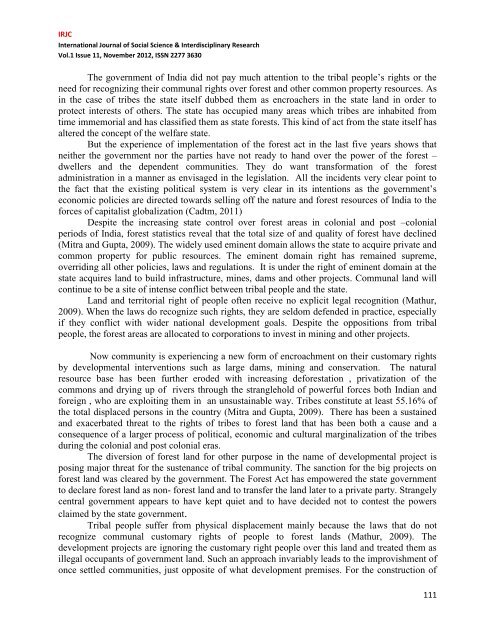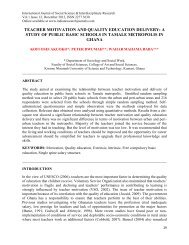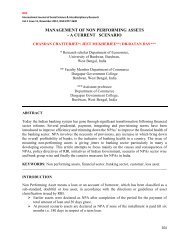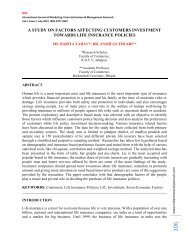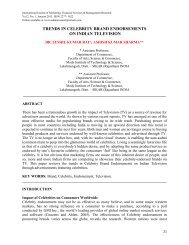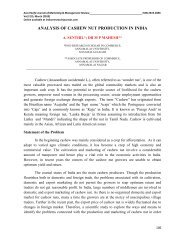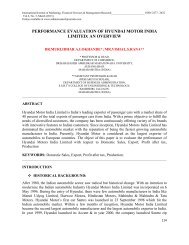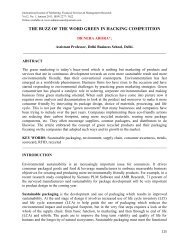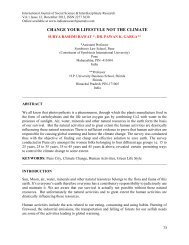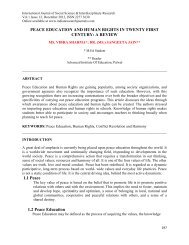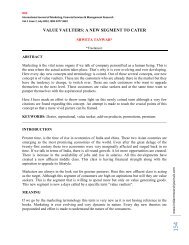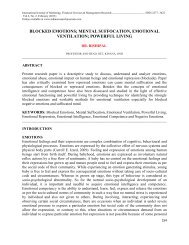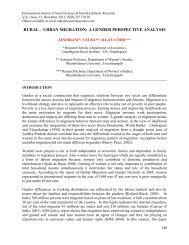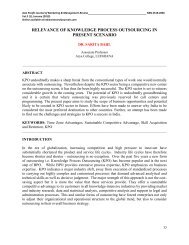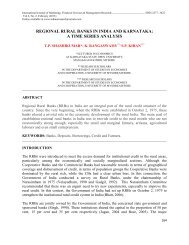historical injustice toward tribals: a reflection on forest policies of india
historical injustice toward tribals: a reflection on forest policies of india
historical injustice toward tribals: a reflection on forest policies of india
Create successful ePaper yourself
Turn your PDF publications into a flip-book with our unique Google optimized e-Paper software.
IRJC<br />
Internati<strong>on</strong>al Journal <strong>of</strong> Social Science & Interdisciplinary Research<br />
Vol.1 Issue 11, November 2012, ISSN 2277 3630<br />
The government <strong>of</strong> India did not pay much attenti<strong>on</strong> to the tribal people‟s rights or the<br />
need for recognizing their communal rights over <strong>forest</strong> and other comm<strong>on</strong> property resources. As<br />
in the case <strong>of</strong> tribes the state itself dubbed them as encroachers in the state land in order to<br />
protect interests <strong>of</strong> others. The state has occupied many areas which tribes are inhabited from<br />
time immemorial and has classified them as state <strong>forest</strong>s. This kind <strong>of</strong> act from the state itself has<br />
altered the c<strong>on</strong>cept <strong>of</strong> the welfare state.<br />
But the experience <strong>of</strong> implementati<strong>on</strong> <strong>of</strong> the <strong>forest</strong> act in the last five years shows that<br />
neither the government nor the parties have not ready to hand over the power <strong>of</strong> the <strong>forest</strong> –<br />
dwellers and the dependent communities. They do want transformati<strong>on</strong> <strong>of</strong> the <strong>forest</strong><br />
administrati<strong>on</strong> in a manner as envisaged in the legislati<strong>on</strong>. All the incidents very clear point to<br />
the fact that the existing political system is very clear in its intenti<strong>on</strong>s as the government‟s<br />
ec<strong>on</strong>omic <strong>policies</strong> are directed <str<strong>on</strong>g>toward</str<strong>on</strong>g>s selling <strong>of</strong>f the nature and <strong>forest</strong> resources <strong>of</strong> India to the<br />
forces <strong>of</strong> capitalist globalizati<strong>on</strong> (Cadtm, 2011)<br />
Despite the increasing state c<strong>on</strong>trol over <strong>forest</strong> areas in col<strong>on</strong>ial and post –col<strong>on</strong>ial<br />
periods <strong>of</strong> India, <strong>forest</strong> statistics reveal that the total size <strong>of</strong> and quality <strong>of</strong> <strong>forest</strong> have declined<br />
(Mitra and Gupta, 2009). The widely used eminent domain allows the state to acquire private and<br />
comm<strong>on</strong> property for public resources. The eminent domain right has remained supreme,<br />
overriding all other <strong>policies</strong>, laws and regulati<strong>on</strong>s. It is under the right <strong>of</strong> eminent domain at the<br />
state acquires land to build infrastructure, mines, dams and other projects. Communal land will<br />
c<strong>on</strong>tinue to be a site <strong>of</strong> intense c<strong>on</strong>flict between tribal people and the state.<br />
Land and territorial right <strong>of</strong> people <strong>of</strong>ten receive no explicit legal recogniti<strong>on</strong> (Mathur,<br />
2009). When the laws do recognize such rights, they are seldom defended in practice, especially<br />
if they c<strong>on</strong>flict with wider nati<strong>on</strong>al development goals. Despite the oppositi<strong>on</strong>s from tribal<br />
people, the <strong>forest</strong> areas are allocated to corporati<strong>on</strong>s to invest in mining and other projects.<br />
Now community is experiencing a new form <strong>of</strong> encroachment <strong>on</strong> their customary rights<br />
by developmental interventi<strong>on</strong>s such as large dams, mining and c<strong>on</strong>servati<strong>on</strong>. The natural<br />
resource base has been further eroded with increasing de<strong>forest</strong>ati<strong>on</strong> , privatizati<strong>on</strong> <strong>of</strong> the<br />
comm<strong>on</strong>s and drying up <strong>of</strong> rivers through the stranglehold <strong>of</strong> powerful forces both Indian and<br />
foreign , who are exploiting them in an unsustainable way. Tribes c<strong>on</strong>stitute at least 55.16% <strong>of</strong><br />
the total displaced pers<strong>on</strong>s in the country (Mitra and Gupta, 2009). There has been a sustained<br />
and exacerbated threat to the rights <strong>of</strong> tribes to <strong>forest</strong> land that has been both a cause and a<br />
c<strong>on</strong>sequence <strong>of</strong> a larger process <strong>of</strong> political, ec<strong>on</strong>omic and cultural marginalizati<strong>on</strong> <strong>of</strong> the tribes<br />
during the col<strong>on</strong>ial and post col<strong>on</strong>ial eras.<br />
The diversi<strong>on</strong> <strong>of</strong> <strong>forest</strong> land for other purpose in the name <strong>of</strong> developmental project is<br />
posing major threat for the sustenance <strong>of</strong> tribal community. The sancti<strong>on</strong> for the big projects <strong>on</strong><br />
<strong>forest</strong> land was cleared by the government. The Forest Act has empowered the state government<br />
to declare <strong>forest</strong> land as n<strong>on</strong>- <strong>forest</strong> land and to transfer the land later to a private party. Strangely<br />
central government appears to have kept quiet and to have decided not to c<strong>on</strong>test the powers<br />
claimed by the state government.<br />
Tribal people suffer from physical displacement mainly because the laws that do not<br />
recognize communal customary rights <strong>of</strong> people to <strong>forest</strong> lands (Mathur, 2009). The<br />
development projects are ignoring the customary right people over this land and treated them as<br />
illegal occupants <strong>of</strong> government land. Such an approach invariably leads to the improvishment <strong>of</strong><br />
<strong>on</strong>ce settled communities, just opposite <strong>of</strong> what development premises. For the c<strong>on</strong>structi<strong>on</strong> <strong>of</strong><br />
111


